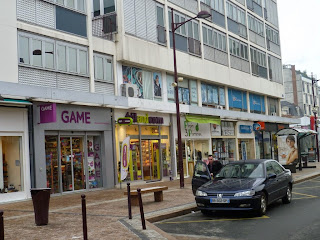Châteauroux, Departamento de Indre, Región
Centro. La ciudad se encuentra junto al río Indre, entre el Berry, Brenne y Boischaut.
Al sur se encuentra el bosque de Châteauroux y por los exteriores de la ciudad
pasa la autopista París-Toulouse. La villa tiene su origen en la fundación de
un castillo de Raoul el Grande, señor de Déols. Desde 1112 el castillo se
conocía como Château Raoul, pues los señores de Déols utilizaban mucho este
nombre. Por la vía Lemovicensis la ciudad está en el itinerario del Camino de
Santiago. Con la muerte del último señor de Déols en 1176, la ciudad pasó a ser
disputada por los reyes de Francia e Inglaterra. Durante la Guerra de los 100
Años, la ciudad sufrió grandes destrucciones, incendiada en 1356 y saqueada en
1374. En 1447 se procedió a fortificar la ciudad y se reconstruyó el castillo.
Châteauroux fue condado desde 1498, pero desde 1503 la ciudad quedó dividida en
dos partes, por problemas sucesorios. En 1612, Enrique de Borbón, Príncipe
Condé, compró los dos lotes. Luis XV adquirió el ducado en 1737 y en 1751 creó
una industria textil. La nueva ruta París-Toulouse favoreció los intereses de
la ciudad. Con la Revolución Industrial la ciudad pasó a ser Prefectura del
Departamento. A principios del siglo XIX, la actividad textil y las industrias
de suministros militares daban ocupación a dos grupos distintos de personas:
civiles y militares. El ferrocarril llegó en 1847 y en 1851 la ciudad derribó
sus murallas para expandirse. En 1856 se instala una industria del tabaco que
empleaba a 1732 personas en 1873, el 91% mujeres. En 1936 se estableció una
industria de aviación. Y en La Martinerie funcionó una base militar USA de 1951
a 1967.
Châteauroux, Indre Department, Central Region.
The city is situated by the river Indre, between Berry, Brenne and Boischaut.
To the south there is the forest of Châteauroux and by the limits of the city
passes the Paris-Toulouse motorway. The villa has its origin in the foundation
of a house of Raoul the Great, Lord of Déols. Since 1112 the castle was known
as Château Raoul, for the lords of Déols used to use much this name. By the Via
Lemovicensis the city is on the itinerary of the Camino de Santiago. With the
death of the last lord of Déols in 1176, the city became disputed by the kings
of France and England. During the 100 Years War, the town suffered great
destruction, burned down in 1356 and sacked in 1374. In 1447 they proceeded to
fortify the city and the castle was rebuilt. Châteauroux was county since 1498,
but since 1503 the city was divided into two parts, because of inheritance
problems. In 1612, Henri de Bourbon, Prince Condé, bought both two lots. Luis
XV acquired the duchy in 1737 and in 1751 created a textile industry. The new
Paris-Toulouse route favored the interests of the city. With the Industrial
Revolution, the city became the Department Prefecture. In the early nineteenth
century, the textile industry and military supply industries gave employment to two different groups of people: civil and
military. The railroad arrived in 1847 and in 1851 the city demolished its
walls to expand. In 1856 the tobacco industry opened a manufacture which
employed 1732 people in 1873, of which 91% were women. In 1936 aviation
industry was established. And in La Martinerie it ran a US military base from 1951
to 1967.







